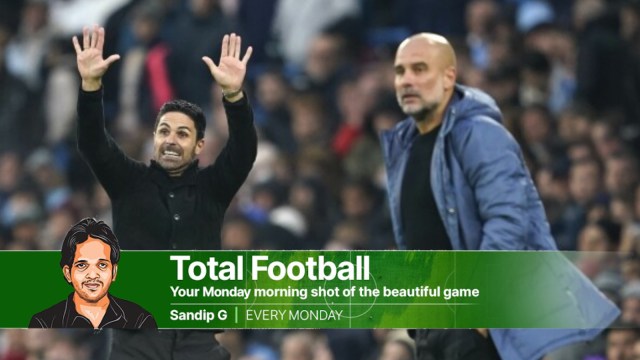
Trash-talkers, time wasters, wind-up merchants, roughhousers. Every football team in the world has their share of the supposed dark-art exponents; those that bend the rule to its limits without breaking them. Some make it all too blatant, some subtle, and some even comical. But in the collective condemning of Arsenal, in mounting themselves on the moral high horse, in projecting the Gunners as those that the exponents of dark arts, the critics have inadvertently held a mirror into the sneaky side of the game.
Arsenal did resort to some skullduggery when down to 10 men against Manchester City, England’s strongest football dynasty helmed by the most influential manager of this era. In the backdrop of ending up second best in the last two seasons, in the collective rage of a clumsy red card, Arsenal did what they had to. Most teams in their place would have embraced similar tactics. Maybe a Marcelo Bielsa team would not have, or that of Arsene Wenger. But almost everyone else would have parked a fleet of buses and put the keys on sale on Amazon, like Arsenal did.
Few teams in the premier league, or anywhere else, can claim innocence. Some of the old dark arts like diving have become outdated with the advent of VAR (players have been diving for penalties since penalties were invented). Like stealing a yard or two, that has become routine (not though the 10-odd yards that Arsenal stole for their equaliser against Manchester City last week). Like kicking the ball away when the opponent has been awarded a free-kick, that guarantees a yellow card. Time wasting is met with sterner punishments, though teams are refining the art.
But footballers keep evolving, they find new holes in the manual that lawmakers don’t. They still evade the eyes of the referee and even the VAR. So much so that every team has a de facto dark-art specialist like they have a prankster and joker.

There are more close challengers for this trophy than the Ballon d’Or. Aston Villa’s Emiliano Martinez could nudge home the title. He loves to whisper sweet nothings in the ears of the penalty takers, he scuffs up the real estate beside the ball so that the penalty-taker slips his landing foot. He delays everything, from goal kicks to penalties, where he suddenly feigns an injury or removes and puts his gloves back again. Little wonder that he accounted for half of the 13 yellow cards Villa copped for time-wasting.
Whereas he is blatant, Arsenal’s Ben White is the master of subtlety. Only multiple replays could capture his phantom tricks. Like in a game against Tottenham Hotspur last year, he stealthily stood behind goalkeeper Guglielmo Vicario for a corner and began pulling at his glove in a crowded goalmouth. An unsettled Vicario dragged him away but found himself destabilised when the deflection of his own teammate Pierre-Emile Hojbjerg flew past him. He is also terrific off the ball, roughening up the forwards with nudges and accidentally coming together when the ball is on play elsewhere and the referee is not looking his way. Another standard White antic is standing in front of the goalkeeper on the line and then suddenly leaping back onside as soon as someone puts the head on the ball. Technically, he does not interfere with the play when the header is being fired. In another instance, he was spotted tickling a goalkeeper’s armpits. An irate Spurs coach Ange Postecoglou retorted: “Mate, seriously? Get the ball and play some football.” That doesn’t mean it’s not a strategy that can’t be used.
The Australian manager has successfully tempered the winding-up instincts of some of his players like Argentine defender Christian Romero (who still makes it appear that the ball has hit his torso and not the arm) and Hojbjerg. “We are no time wasters,” Postecoglou recently said. It was backed by the stat that his team was the quickest to get the game moving again (24.4 seconds per restart) last season. Maybe that’s why they ended up losing far too many games in the last 15 minutes last season.

A last-gasp mention should be for Liverpool’s Andy Robertson, whose cheeky knock on Lionel Messi in a Champions League semifinal went both undetected and unpunished. He later confessed he regretted it but that did not prevent him pasting Manchester City full-back Kyle Walker onto the advertising board. Calm of nature, volatile when needed.
For some reason, conversations about dark arts predominantly feature defenders (if only Sergio Ramos were around) and goalkeepers. Not quite so the forwards, now that diving is a futile exercise. But Leicester City talisman Jamie Vardy is a wind-up virtuoso who gets under the skin of defenders. The former Brentford striker Ivan Toney was an exceptional method actor, now lost to the riches of the Saudi league. As a team, one that functions as collectively, Eddie Howe’s Newcastle United are experts at drawing fouls and committing tactical ones to disrupt the game’s rhythm. It is not surprising that he once tailed Atletico Madrid’s Diego Simeone, the patron saint of dark arts, for an entire season to imbibe the tricks. Howe’s mantra is borne on the club flags and waved rigorously: “We’re not here to be popular; we’re here to compete.”
Time to time, the governing body opens the blindfold and make new sanctions. But do they really serve the purpose? Clearly not. Footballers, managers, and the whole ecosystem would continue to improvise. Whether those are anti-football or immoral is another debate altogether. But it exists, would exist, and the critics gnashing their teeth at Arsenal are just being pretentious.



